Oceania Football Confederation
 | |
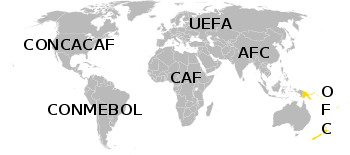 | |
| Abbreviation | OFC |
|---|---|
| Formation | 1966 |
| Type | Sports organisation |
| Headquarters | Auckland, New Zealand |
Membership | 14 member associations (11 full) |
Official language | English |
|
Lambert Maltock acting | |
Parent organization | FIFA |
| Website |
www |
| FIFA confederations |
|---|
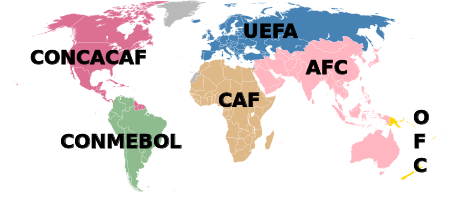 |
| AFC, CAF, CONCACAF |
| CONMEBOL, OFC, UEFA |
The Oceania Football Confederation (OFC) is one of the six continental confederations of international association football, consisting of New Zealand, Papua New Guinea, Fiji, Tonga, and other Pacific Island countries. It promotes the game in Oceania and allows the member nations to qualify for the FIFA World Cup.
OFC is predominantly made up of island nations where association football is not the most popular sport. Consequently, the OFC has little influence in the wider football world, either in terms of international competition or as a source of players for high-profile club competitions. In 2006, the OFC's largest and most successful nation, Australia, left to join the Asian Football Confederation, leaving New Zealand as the largest federation within the OFC.
David Chung has been the President of OFC until April 2018. Rajesh Patel is the Senior Vice President, Lee Harmon is the Vice-President while Tai Nicholas is the General Secretary.[1]
Oceania is the only confederation to have not had at least one international title (AFC has won the Women's World Cup, CAF has enjoyed Olympic success, and members of the CONCACAF have won the Confederations Cup as well enjoyed successes in the Women's World Cup), the best result being Australia making the final of the 1997 Confederations Cup.
Member nations
Current members
OFC is made up of 11 full member associations and 3 associate members. Those three are associate members of the OFC, but are not FIFA members.[2]
| Code | Association | National teams | Founded | Membership | FIFA affiliation |
OFC affiliation |
IOC member |
|
|---|---|---|---|---|---|---|---|---|
| ASA | (M, W) | 1984 | Full | 1998 | 1998 | Yes | [Note 1] | |
| COK | (M, W) | 1971 | Full | 1994 | 1994 | Yes | [Note 2] | |
| FIJ | (M, W) | 1938 | Full | 1964 | 1966 | Yes | ||
| KIR | (M, W) | 1980 | Associate | N/A | 2007 | Yes | ||
| NCL | (M, W) | 1928 | Full | 2004 | 2004 | No | [Note 3] | |
| NZL | (M, W) | 1891 | Full | 1948 | 1966 | Yes | ||
| NIU | (M, W) | 1960 | Associate | N/A | 2006 | No | [Note 2] | |
| PNG | (M, W) | 1962 | Full | 1966 | 1966 | Yes | ||
| SAM | (M, W) | 1968 | Full | 1986 | 1986 | Yes | ||
| SOL | (M, W) | 1979 | Full | 1988 | 1988 | Yes | ||
| TAH | (M, W) | 1989 | Full | 1990 | 1990 | Yes | [Note 3] | |
| TGA | (M, W) | 1965 | Full | 1994 | 1994 | Yes | ||
| TUV | (M, W) | 1979 | Associate | N/A | 2006 | Yes | ||
| VAN | (M, W) | 1934 | Full | 1988 | 1988 | Yes |
Notes
- ↑ Unincorporated territory of the United States
- 1 2 Free associated state with New Zealand
- 1 2 Collectivity of France
Former members

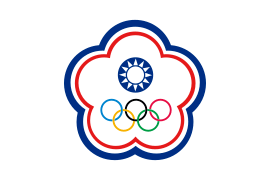
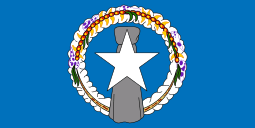
Israel entered OFC World Cup qualification in 1986 and 1990 due to political reasons, though it never became a formal OFC member.
Non-members
Several sovereign states or dependencies in Oceania have national teams with no affiliation. All play infrequently and may have been inactive for several years. There are also some which do not have a national team.
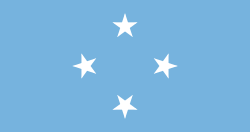
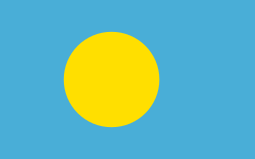

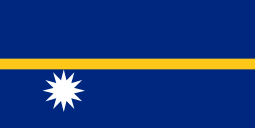
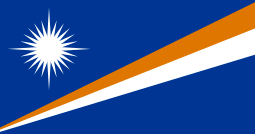
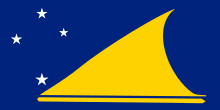
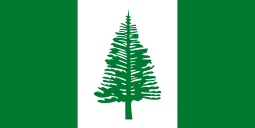
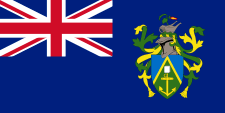
Sovereign states and dependencies with territory in Oceania but are members of other federations:
Asian Football Confederation
History
The confederation formed in 1966 with the following as founding members[4]:
- the Australian Soccer Federation (from 2005: Football Federation Australia)
- New Zealand Soccer (subsequently New Zealand Football)
- the Fiji Football Association
- the Papua New Guinea Football Association
Australia resigned as an OFC member in 1972 to pursue membership with the AFC, but they rejoined in 1978.[5][6] Chinese Taipei were an OFC member from 1975 to 1989. In 1996 FIFA confirmed the OFC as a full confederation and granted it a seat on the FIFA executive.[7] In 1998 the OFC unveiled a new logo and an official magazine, entitled The Wave. On 24 May 2004, New Caledonia became the 12th member of the OFC. On 1 January 2006, Australia left the OFC again and joined the Asian Football Confederation. In 2008 an associate member, the Northern Mariana Islands Football Association, also left the OFC and in 2009 joined the AFC as a quasi-member. In late 2009 the Palau Soccer Association also applied for the same status with the AFC.[8]
Presidents
Competitions
Current champions
| Competitions | Champion | Title | Runner-Up | Next edition |
|---|---|---|---|---|
| Clubs | ||||
| OFC Champions League | 1st | 2019 | ||
| Nations men | ||||
| OFC Nations Cup | 5th | 2020 | ||
| OFC U-20 Championship | 6th | 2018 | ||
| OFC U-17 Championship | 6th | 2018 | ||
| OFC Men's Olympic Qualifying Tournament | 1st | 2019 | ||
| OFC Futsal Championship | 5th | 2018 | ||
| OFC Youth Futsal Tournament | 1st | 2018 | ||
| OFC Beach Soccer Championship | 4th | 2019 | ||
| Nations women | ||||
| OFC Women's Nations Cup | 5th | 2018 | ||
| OFC U-20 Women's Championship | 6th | 2019 | ||
| OFC U-17 Women's Championship | 4th | 2019 | ||
| OFC Women's Olympic Qualifying Tournament | 3rd | 2018 | ||
OFC Competitions
FIFA World Cup qualifiers
Oceania has sent representatives to the FIFA World Cup four times: Australia in 1974 and 2006, and New Zealand in 1982 and 2010. (Australia has additionally qualified three times since leaving the OFC for the AFC following the 2006 FIFA World Cup: 2010, 2014 and 2018.) Neither Australia in 1974 nor New Zealand in 1982 and 2010 progressed beyond the first round. Of the four teams, only Australia in 2006 advanced to the second round.
The OFC is the only FIFA confederation that does not have a guaranteed spot in the World Cup finals (a major reason for Australia's leaving the confederation in 2006 to join Asia). Between 1966 and 1982, OFC teams joined the Asian zone qualification tournament, while from 1986 onwards, the winners of the Oceanian zone qualification tournament have to enter the intercontinental play-offs against teams from other confederations in order to gain a spot in the FIFA World Cup finals.
Senior OFC teams record
| OFC FIFA World Cup record | ||||||||||
|---|---|---|---|---|---|---|---|---|---|---|
| Year | Qualifier | Round | Position | GP | W | D* | L | GS | GA | Format |
| No teams from Oceania entered | ||||||||||
| No OFC team qualified | Entered in Africa and Asia | |||||||||
| Entered in Asia | ||||||||||
| Group stage | 14th | 3 | 0 | 1 | 2 | 0 | 5 | Entered in Asia | ||
| No OFC team qualified | Entered in Asia | |||||||||
| Group stage | 23rd | 3 | 0 | 0 | 3 | 2 | 12 | Entered in Asia | ||
| No OFC team qualified | Round-robin Play-off | |||||||||
| First round Second round Play-off | ||||||||||
| First Round Second Round 1st play-off 2nd play-off | ||||||||||
| First Round Second Round Third Round Play-off | ||||||||||
| First Round Second Round Play-off | ||||||||||
| Round of 16 | 16th | 4 | 1 | 1 | 2 | 5 | 6 | First Round Second Round Third Round Play-off | ||
| Group stage | 22nd | 3 | 0 | 3 | 0 | 2 | 2 | First Round Second Round Play-off | ||
| No OFC team qualified | First Round Second Round Third Round Play-off | |||||||||
| First Round Second Round Third Round Play-off | ||||||||||
| To be determined | ||||||||||
| Total | 4/20 | Round of 16 | 13 | 1 | 5 | 7 | 9 | 25 | ||
- ↑ Australia qualified through OFC qualifying competition however the Football Federation Australia officially left the OFC and joined the AFC on 1 January 2006.
OFC play-off record
1970 AFC–OFC Final Round
| Team 1 | Agg. | Team 2 | 1st leg | 2nd leg |
|---|---|---|---|---|
| Israel |
2–1 | 1–0 | 1–1 |
1974 AFC–OFC Final Round
| Team 1 | Agg. | Team 2 | 1st leg | 2nd leg |
|---|---|---|---|---|
| Australia |
2–21 | 0–0 | 2–2 |
1 Australia beat South Korea 1–0 in a play-off to qualify for the FIFA World Cup.
| Team 1 | Agg. | Team 2 | 1st leg | 2nd leg |
|---|---|---|---|---|
| Scotland |
2–0 | 2–0 | 0–0 |
| Team 1 | Agg. | Team 2 | 1st leg | 2nd leg |
|---|---|---|---|---|
| Colombia |
1–0 | 1–0 | 0–0 |
Israel played in the OFC zone for political reasons.
| Team 1 | Agg. | Team 2 | 1st leg | 2nd leg |
|---|---|---|---|---|
| Canada |
3–3 (P) | 2–1 | 1–2 |
| Team 1 | Agg. | Team 2 | 1st leg | 2nd leg |
|---|---|---|---|---|
| Australia |
1–2 | 1–1 | 0–1 |
| Team 1 | Agg. | Team 2 | 1st leg | 2nd leg |
|---|---|---|---|---|
| Iran |
(A) 3–3 | 1–1 | 2–2 |
| Team 1 | Agg. | Team 2 | 1st leg | 2nd leg |
|---|---|---|---|---|
| Australia |
1–3 | 1–0 | 0–3 |
| Team 1 | Agg. | Team 2 | 1st leg | 2nd leg |
|---|---|---|---|---|
| Uruguay |
1–1 (P) | 1–0 | 0–1 |
| Team 1 | Agg. | Team 2 | 1st leg | 2nd leg |
|---|---|---|---|---|
| Bahrain |
0–1 | 0–0 | 0–1 |
| Team 1 | Agg. | Team 2 | 1st leg | 2nd leg |
|---|---|---|---|---|
| Mexico |
9–3 | 5–1 | 4–2 |
| Team 1 | Agg. | Team 2 | 1st leg | 2nd leg |
|---|---|---|---|---|
| New Zealand |
0–2 | 0–0 | 0–2 |
FIFA U-20 World Cup
- See also: Men's U-20 World Cup Qualifiers
FIFA U-17 World Cup
- See also: Men's U-17 World Cup Qualifiers
Women's World Cup Finals
Australia is no longer an OFC member since 2006, when they joined the AFC.
| Team | 1991 | 1995 | 1999 | 2003 | 2007 | 2011 | 2015 | Total |
|---|---|---|---|---|---|---|---|---|
| GS | GS | GS | part of AFC | 3 | ||||
| GS | GS | GS | GS | 4 | ||||
- See also Women's U-20 World Cup Qualifiers
- See also Women's U-17 World Cup Qualifiers
FIFA Confederations Cup
- Legend
- 1st – Champions
- 2nd – Runners-up
- 3rd – Third place
- 4th – Fourth place
- GS – Group stage
- Q — Qualified for upcoming tournament
- q — Qualified; tournament in progress
- •• — Qualified but withdrew
- • — Did not qualify
- × — Did not enter / Withdrew from the OFC Nations Cup or withdrew from the Confederations Cup / Banned
- — Hosts
| Team | 1992 |
1995 |
1997 |
1999 |
2001 |
2003 |
2005 |
2009 |
2013 |
2017 |
2021 |
Total |
|---|---|---|---|---|---|---|---|---|---|---|---|---|
| × | × | 2nd | • | 3rd | • | GS | 3 | |||||
| • | • | • | GS | • | GS | • | GS | • | GS | 4 | ||
| • | • | • | • | • | • | • | • | GS | • | 1 | ||
| Total | 0 | 0 | 1 | 1 | 1 | 1 | 1 | 1 | 1 | 1 | 8 | |
FIFA Futsal World Cup
- Legend
- 1st — Champions
- 2nd — Runners-up
- 3rd — Third place
- 4th — Fourth place
- QF — Quarterfinals
- R2 — Round 2 (1989–2008, second group stage, top 8; 2012–present: knockout round of 16)
- R1 — Round 1
- Q — Qualified for upcoming tournament
- — Hosts
| Nation | 1989 | 1992 | 1996 | 2000 | 2004 | 2008 | 2012 | 2016 | Years |
|---|---|---|---|---|---|---|---|---|---|
| R1 | R1 | R1 | R1 | R1 | 5 | ||||
| R1 | R1 | R1 | 3 | ||||||
| Nations | 1 | 1 | 1 | 1 | 1 | 1 | 1 | 1 |
FIFA Beach Soccer World Cup
- Legend
- 1st — Champions
- 2nd — Runners-up
- 3rd — Third place
- 4th — Fourth place
- QF — Quarterfinals (1999–2001, 2004–present)
- R1 — Round 1
- q — Qualified for upcoming tournament
- •• — Qualified but withdrew
- • — Did not qualify
- — Hosts
| Nation | 1995 |
1996 |
1997 |
1998 |
1999 |
2000 |
2001 |
2002 |
2003 |
2004 |
2005 |
2006 |
2007 |
2008 |
2009 |
2011 |
2013 |
2015 |
2017 |
Years |
|---|---|---|---|---|---|---|---|---|---|---|---|---|---|---|---|---|---|---|---|---|
| • | • | • | • | • | • | • | • | • | • | R1 9th |
1 | |||||||||
| • | • | • | • | • | • | • | • | • | • | • | R1 12th |
R1 16th |
R1 12th |
R1 13th |
• | R1 11th |
• | 5 | ||
| • | • | • | • | • | • | • | • | • | • | • | • | • | • | • | R1 12th |
4th | 2nd | 2nd | 4 | |
| Nations | 0 | 0 | 0 | 0 | 0 | 0 | 0 | 0 | 0 | 0 | 1 | 1 | 1 | 1 | 1 | 1 | 2 | 1 | 1 |
National Team rankings
| Top men's national teams Rankings are calculated by FIFA. |
— | Top women's national teams Rankings are calculated by FIFA. | ||||||
|---|---|---|---|---|---|---|---|---|
| OFC | FIFA | Nation | Points | OFC | FIFA | Nation | Points | |
| 1 | 120 | 256 | 1 | 20 | 1810 | |||
| 2 | 143 | 190 | 2 | 148** | 1473 | |||
| 3 | 154 | 150 | 1292 | |||||
| 4 | 157 | 130 | 1258 | |||||
| 5 | 117 | 117 | 1252 | |||||
| 6 | 165 | 104 | 1238 | |||||
| 7 | 166 | 103 | 1185 | |||||
| 8 | 192 | 38 | 1144 | |||||
| 9 | 192 | 38 | 1139 | |||||
| 10 | 197 | 32 | 1138 | |||||
| 11 | 205 | 0 | 1075 | |||||
- * – Provisionally listed due to not having played more than five matches against officially ranked teams
- ** – Inactive for more than 18 months and therefore not ranked
References
- ↑ "Oceania Football Confederation - OFC Home". oceaniafootball.com. Archived from the original on 9 February 2013. Retrieved 14 March 2017.
- ↑ "Member Associations". Oceania Football. Oceania Football Confederation.
- ↑ "Oceania Football Confederation - Content". archive.org. 6 October 2009. Archived from the original on 6 October 2009. Retrieved 14 March 2017.
- ↑ A Dictionary of Sports Studies. ISBN 019921381X.
- ↑ OFC History oceaniafootball.com
- ↑ "Oceania admit Taiwan and Aussies quit". Reuters, UPI. The Straits Times. 1 March 1976.
- ↑ FIFA.com. "FIFA Congress - FIFA.com". fifa.com. Retrieved 14 March 2017.
- ↑ "Archived copy". Archived from the original on 2012-02-07. Retrieved 2012-03-27.
- ↑ FIFA.com. "The FIFA/Coca-Cola World Ranking - Ranking Table - Oceanian Zone - FIFA.com". fifa.com. Retrieved 2 July 2018.
- ↑ FIFA.com. "The FIFA Women's World Ranking - Oceanian Zone - FIFA.com". fifa.com. Retrieved 2 July 2018.
See also
External links
- Oceania Football Confederation official website
- Oceania Football Confederation, SoccerLens.com. Retrieved: 10 September 2010.
